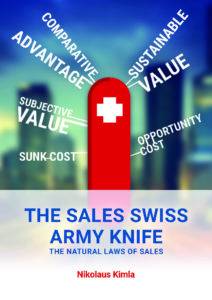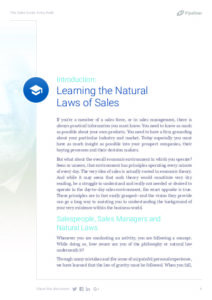If you’re a member of a sales force, or in sales management, there is always practical information you must know. You need to know as much as possible about your own products. You need to have a firm grounding about your particular industry and market. Today especially you must have as much insight as possible into your prospect companies, their buying processes and their decision makers.
But what about the overall economic environment in which you operate? Seen or unseen, that environment has principles operating every minute of every day. The very idea of sales is actually rooted in economic theory. And while it may seem that such theory would constitute very dry reading, be a struggle to understand and really not needed or desired to operate in the day-to-day sales environment, the exact opposite is true. These principles are in fact easily grasped—and the vision they provide can go a long way to assisting you in understanding the background of your very existence within the business world.
In fact…they make for your very own Sales Swiss Army Knife! And this ebook, for a salesperson, is exactly that.
Principle 1:
Averting Sales Risk with Sunk Cost
What is the principle of sunk cost, and how can it be practically applied to sales? For it certainly can.
Sunk cost is a principle of economics. Sunk costs are costs that a company has already invested in products or services that must now be profitably recovered. These are costs that your company has already “sunk” into raw materials, development or production and, where applicable, storage. They are fixed costs because the money has already been spent; they will not fluctuate.
Principle 2:
Know Your Opportunity Cost!
Opportunity cost is the investment your company must make to achieve a sale, and it has a bearing on every company activity associated with a sales cycle. It is applicable equally on the higher level of entrepreneurship as well as at the level of the sales force—which of course includes sales reps and sales management.
Principle 3:
Subjective Value and What It Means to Sales
Subjective value is the perceived value of your product or service in the mind of the prospect. According to one of the founding fathers of the Austrian School of Economics, Ludwig von Mises, “Value is not intrinsic, it is not in things. It is within us; it is the way in which man reacts to the conditions of his environment.”
Principle 4:
Sales Management and Comparative Advantage
There is an economic principle called comparative advantage which can be a tremendous benefit to sales management.
Principle 5:
Sustainable Value Means Sales Effectiveness
What is sustainable value? Stated simply, it is “value that keeps on giving.” For the customer it is that quality of a product, service or company that always delivers, that is always there. For the seller, it is an opportunity or an account that pays for itself over and over.
Sustainable value should be the highest aim of a seller—for keeping and expanding one customer is far more cost-effective than obtaining a new customer.
Afterword 1:
What do Salespeople Mean to the World?
As a salesperson, you are engaged day-in and day-out in moving deals toward closes. You have most likely given little thought to what your activities might mean in the grand scheme of things, to the world at large. If you have, you might have even brushed them off as having little to no consequence. But believe it or not your role as a salesperson has a more profound significance than you might think: Salespeople are the wealth creators and the peace producers of the world.
Afterword 2:
The Austrian School of Economics
The important principles that we have touched upon in this ebook—sunk cost, opportunity cost, subjective value, comparative value and sustainable value—all have their roots in the Austrian School of Economics. Here is a bit about the Austrian School’s founding fathers and their contribution milestones.


































Comments